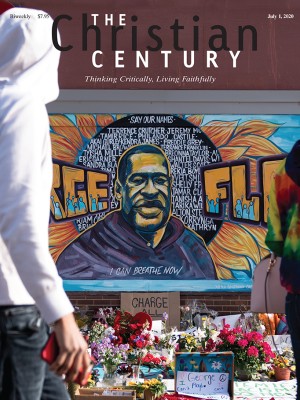July 12, 15A (Romans 8:1–11)
What if all the energy we spent on taming the flesh were channeled toward loving the world?
Christians love to hate the flesh.
We’ve all seen how destructive this impulse can be. When more conservative churches focus on same-sex attraction, the results can be deadly. By now most of them have begun to realize that “reparative therapy” is dangerous and potentially deadly. They’ve turned to a new model, one that teaches that attraction to those of the same sex is not unlike alcoholism. You might be gay, and that’s OK—but God can help you resist acting on it, one day at a time. So long as you are celibate, you are fighting the good fight.
Then there’s the question of gender identity. We’ve all heard the rhetoric about trans or nonbinary people somehow being unfaithful by failing to accept their “God-given gender.” This gender, of course, should always match their biological sex as assigned at birth. Oh, and it must always be presented in a strictly binary manner.
Read our latest issue or browse back issues.
If you’re a mainline Protestant like me, you’re probably agreeing that these takes on sex and gender are outdated and insensitive. Yes, some Christians might feel this way. But we are not that kind of Christian. And we will march in every Pride parade we can just to prove it.
Paul’s letter to the Romans makes us uncomfortable. We don’t like the idea that bodies are sinful. We read the line, “the mind that is set on the flesh is hostile to God; it does not submit to God’s law—indeed it cannot,” and we can’t help but think of the harm done to LGBTQ people in the name of the church.
But that doesn’t mean we don’t hate the flesh just as much.
In both conservative and more liberal Christian contexts, I often find that people equate weight with holiness. This can be heavy-handed, such as the assumption that being overweight means being a glutton and therefore sinful. It can also be subtler, like the buttons that were handed out a few years back at my denomination’s general synod that read, “The Best Me is a Fit Me.” The United Methodist Church has even gone so far as to make a candidate for ministry’s weight a subject of discussion in their ordination process.
What’s interesting to me is the way that Christian takes on weight so often mirror the ways that we have talked about sex and sexuality. Books on Christian weight loss tell us to control the flesh, to suffer in order to be better servants of God, and to fight the good fight against food. Churches that rightly decline to let most for-profit entities use their buildings turn a blind eye when it comes to Weight Watchers meetings. (Are you paying taxes on the space they rent from you, by the way? Because legally, you need to be.) At the end of the day we justify it by saying it somehow is providing a service to the community—and by equating weight loss with health. We falsely equate 12-step fellowships, which are nonprofit and peer-based, with a company that last year raked in $1.4 billion in revenue.
You may disagree with me here, and that’s OK. But with this reading coming up in the lectionary, I know at least a few pastors are thinking of standing in the pulpit and talking about their diets. They’ll talk about counting points and burning calories at the gym. They’ll put holy language around their quest for smaller bodies.
The problem with this is that there are people in your congregation for whom this kind of theology is as deadly as any other body-denying perspective out there. Young people struggling with eating disorders. Trans and gender-nonconforming folks wrestling with societal assumptions about what a masculine or feminine body should look like. People who are struggling with medical issues that won’t allow them to eat the diet that you are suggesting. They’ll hear your sermon, and they’ll think that in order to be holy, they must do as you do.
When I read Paul’s words, I sometimes wonder if the point is not so much a need to control the flesh as a need to not be obsessed with it to the point of distraction. Everyone deserves to feel good in their bodies, and you should do whatever feels good to you in order to feel good about yours.
But have you ever wondered what the world would be like if Christians stopped obsessing so much over controlling bodies, both our own and those of others, and used all of that energy to further the mission of the church? How much brain power, emotional anguish, and time do we spend on taming the flesh that could be better spent on loving the world?
And, most importantly, what would a world look like in which every body, no matter how it exists in the world, was seen as a beautiful manifestation of the image of God?





